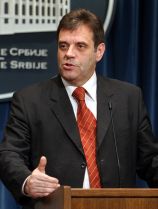Q:
A:
New constitution combines both state and national interests
Belgrade,
30 September 2006
Serbian Prime Minister Vojislav Kostunica voiced his belief today that once Serbian parliament adopts the new constitution tonight, the people will once again confirm at the referendum that Serbia needs this supreme legal act and that Kosovo-Metohija is a constituent part of Serbia.
At a press conference held at the Serbian government Kostunica said that two important state and national interests have been merged in the new constitution – that Serbia gets a new constitution and that this constitution confirms what the government has been obliged to do consulting parliament and the widest spectrum of public, namely that Kosovo is a constituent part of Serbia and has essential autonomy.
He said that unlike the current one, the new constitution is “alive” and will be able to evolve as Serbia evolves since there will be no hindrances or obstacles for this change.
The Serbian Prime Minister announced that after the referendum at which citizens will vote on the proposed new constitution, elections will be held at all levels. For this to take place it is necessary to pass a law on elections and amend the existing electoral laws, said Kostunica adding that he believes this will happen very quickly and will result from an agreement of parliamentary parties.
Kostunica stated that the electoral body at the referendum will be the same as at the elections held in 2000. When asked if this means that Kosovo ethnic Albanians will be excluded, the Prime Minister gave an affirmative answer.
He said that citizens who are on the single list of voters established after October 5, 2000, will have the right to vote at the referendum on Serbia’s new constitution.
The electorate will be the same as in all previous elections, including the ones held in December 2000 when Serbian parliament was constituted for the first time after the events of October 5, specified Kostunica and reiterated that there already is a list according to which all elections are held.
Kostunica said he is pleased with all that has been done with the aim of adopting the first legal act that will keep entire Serbia close together, give it strength and direct it towards Serbia’s European future.
He stressed that after the people vote for it at the referendum, there is nothing more important and pressing than the task of making the new constitution something “alive” that will open the road to Serbia’s further development.
The Serbian Prime Minister said that the discussion about the constitution was probably the longest ever and that perhaps no other constitution was reached through this many proposals.
The widest spectrum of public opinion, including experts was heard and taken into consideration, said Kostunica and added that in a formal sense, the constitution was under discussion for two and a half years whereas informally it was discussed for six years.
According to Kostunica, Serbia must have a strong legal foundation which is not possible without a good constitution, because for the country to develop and become a functional and legal state, a new constitution is needed as a form of the country’s identity card.
He said that unlike the current one, the new constitution is “alive” and will be able to evolve as Serbia evolves since there will be no hindrances or obstacles for this change.
The Serbian Prime Minister announced that after the referendum at which citizens will vote on the proposed new constitution, elections will be held at all levels. For this to take place it is necessary to pass a law on elections and amend the existing electoral laws, said Kostunica adding that he believes this will happen very quickly and will result from an agreement of parliamentary parties.
Kostunica stated that the electoral body at the referendum will be the same as at the elections held in 2000. When asked if this means that Kosovo ethnic Albanians will be excluded, the Prime Minister gave an affirmative answer.
He said that citizens who are on the single list of voters established after October 5, 2000, will have the right to vote at the referendum on Serbia’s new constitution.
The electorate will be the same as in all previous elections, including the ones held in December 2000 when Serbian parliament was constituted for the first time after the events of October 5, specified Kostunica and reiterated that there already is a list according to which all elections are held.
Kostunica said he is pleased with all that has been done with the aim of adopting the first legal act that will keep entire Serbia close together, give it strength and direct it towards Serbia’s European future.
He stressed that after the people vote for it at the referendum, there is nothing more important and pressing than the task of making the new constitution something “alive” that will open the road to Serbia’s further development.
The Serbian Prime Minister said that the discussion about the constitution was probably the longest ever and that perhaps no other constitution was reached through this many proposals.
The widest spectrum of public opinion, including experts was heard and taken into consideration, said Kostunica and added that in a formal sense, the constitution was under discussion for two and a half years whereas informally it was discussed for six years.
According to Kostunica, Serbia must have a strong legal foundation which is not possible without a good constitution, because for the country to develop and become a functional and legal state, a new constitution is needed as a form of the country’s identity card.
He explained that the current constitution, adopted in 1991 by a single-party parliament, is outdated and has several drawbacks since constitutional law has changed in the meantime, new institutions have been created, new forms of law protection and restrictions of authorities have been introduced, and all of it has to be included in the country’s supreme act.
Speaking about the constitutional definition of Kosovo as a constituent part of Serbia, Kostunica stressed that apart from referring to international law, Kosovo should also be defended by means of Serbia’s domestic law, which can best be done through the new constitution where it is most clearly stated that Kosovo-Metohija is a part of Serbia.
The constitution will not be altered regardless of the outcome of negotiations on the province’s future status. There will be no changes no matter what occurs at the talks, said Kostunica adding that once the new constitution is adopted, the government’s mandate will naturally come to a close.
Speaking about Serbia’s cooperation with the Hague Tribunal, Kostunica said that considering the level of cooperation achieved between Belgrade and the Tribunal, it will be best and highly logical to continue the talks on the Stabilisation and Association Agreement with the EU.
I have said on countless occasions that it is in Serbia’s interest to conclude the cooperation with The Hague. I would like to add one more thing: when you put together the results of the cooperation with the Hague Tribunal, it is clear that no government has done as much as the current Serbian government, stressed the Prime Minister.
The Action Plan obliges both parties. It was not adopted solely by the Serbian government, but in cooperation with the EU. Therefore, it is a framework for cooperation, and a good one at that. The Hague Tribunal’s Chief Prosecutor Carla Del Ponte will visit Belgrade and be briefed on the results achieved within the plan, concluded Kostunica.
Speaking about the constitutional definition of Kosovo as a constituent part of Serbia, Kostunica stressed that apart from referring to international law, Kosovo should also be defended by means of Serbia’s domestic law, which can best be done through the new constitution where it is most clearly stated that Kosovo-Metohija is a part of Serbia.
The constitution will not be altered regardless of the outcome of negotiations on the province’s future status. There will be no changes no matter what occurs at the talks, said Kostunica adding that once the new constitution is adopted, the government’s mandate will naturally come to a close.
Speaking about Serbia’s cooperation with the Hague Tribunal, Kostunica said that considering the level of cooperation achieved between Belgrade and the Tribunal, it will be best and highly logical to continue the talks on the Stabilisation and Association Agreement with the EU.
I have said on countless occasions that it is in Serbia’s interest to conclude the cooperation with The Hague. I would like to add one more thing: when you put together the results of the cooperation with the Hague Tribunal, it is clear that no government has done as much as the current Serbian government, stressed the Prime Minister.
The Action Plan obliges both parties. It was not adopted solely by the Serbian government, but in cooperation with the EU. Therefore, it is a framework for cooperation, and a good one at that. The Hague Tribunal’s Chief Prosecutor Carla Del Ponte will visit Belgrade and be briefed on the results achieved within the plan, concluded Kostunica.













